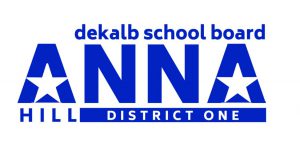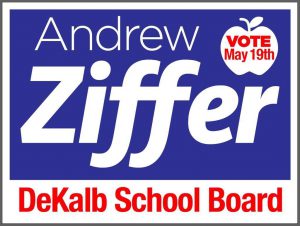Monday, July 20, 2020
My dear wormwood....
The use of fashions in thought is to distract men from their real dangers. We direct the fashionable outcry of each generation against those vices of which it is in the least danger, and fix its approval on the virtue that is nearest the vice which we are trying to make endemic. The game is to have them all running around with fire extinguishers whenever there’s a flood; and all crowding to that side of the boat which is already nearly gone under.
― C.S. Lewis, The Screwtape Letters
Monday, March 9, 2020
DeKalb Board of Ed District 1 Candidate Forum March 29
 |
 |
Mr Andrew Ziffer and Ms Anna Hill have both agreed to participate in the traditional DHA Candidate Forum as they campaign for the District 1 DeKalb County Board of Education seat.
As always, questions for candidate forums come from the public. Please submit topics via the secure form below. Questions will be organized by DHA executive board members. All information will be kept private and will not be distributed to other parties for any reason.
Sunday, February 2, 2020
DHA 2020 Annual Meeting - President's Opening Remarks
I needed some inspiration for comments at a 50th anniversary kickoff. DHA was incorporated with the SoS in June of 1970. Most of what I learned about the early days of DHA came from personal stories with more seasoned members of the board, past and present. The DHA came about at the same time as the Garden Club, the Crier newspaper, and the earliest subdivisions in Dunwoody North and Georgetown. But I needed a place to start for today’s event.
While putting away the parade banners in the storage space, I took a moment to dig around in the filing cabinet where old paper records are kept. The first binder I saw was a collection of notes from 1995 - DHA’s 25th anniversary. Rob Augustine was president at the time. Newsletters were printed and mailed - e-mail, instant messaging and America OnLine were only beginning to take hold. Social media didn’t exist. Correspondence on letterhead with original logos and a list of directors in the margin with many familiar names. There was legal correspondence requesting support for a development project that became Congregation Ariel.
There was organized opposition to a satellite “Dish Farm” on Mt. Vernon Road. A reference to government being proactive towards “affrontery” to Dunwoody’s quality of life. There was a lot of negotiation over signage and commercial buildings in close proximity to homes. DeKalb County was nowhere to be found.
A page of hand-written notes described an early July 4th parade. The number of participants was modest enough that the Harris-Teeter grocery store (where Sprouts used to be) offered breakfast to everyone - FREE.
June of 1995 introduced the idea of an overlay district around Dunwoody Village as a means of improving quality of life. There was even a suggestion that it should be applied to all neighborhood-scale commercial nodes that was called “Dunwoody” at the time. That idea took root in the construction of the Williamsburg center off of Jett Ferry Road and Independence Square off of Peeler and Chamblee-Dunwoody.
This summer of 1995 the board composed a letter to the DeKalb County School System to advise on the qualities of a school superintendent that was being sought. The presidents address at that annual meeting promoted mass transit and freeway improvements that would take commuter traffic around Dunwoody and not through it. This was before the Sandy Springs and North Springs MARTA stations were completed.
Sound familiar?
In 2018 and 2019, there was a lot of interest in what kind of “community center” Dunwoody Village should be. Not only were there plenty of long-time residents but lots of new Dunwoody citizens too. New citizens, who had no idea what an overlay district is, who were not involved with the initial planning of the area. They were passionate about updating a *shopping center* of all things. Why? Why should anyone care so much about a shopping center? And why this one, instead of many others you can find anywhere? Including the Perimeter center?
The answer is because of the DHA’s efforts back in the 1990s to define this center as the “heart”. We can talk about what architectural styles are outdated and what should be kept. Those preferences are going to change with the generations and that’s normal. All of those nice new perimeter buildings going up - condos, new signage around the mall, new commercial buildings, whatever is defined in the updated Village overlay code this year - in another 25 years, someone is going to groan and say, “Good God, what were they thinking?” And then someone will lead a charge to change it again.
The value of the overlay district is not in the styles themselves but by the very act of defining “This place is special.” This place is Unique in all of the Perimeter and will not be infiltrated by the more urban-style development on 285. Dunwoody wants to remain a small town, no matter how big Metro Atlanta becomes. The new “heart” is worth sweating the small stuff and paying attention to the details. We nurture this area as something valuable. And, as a result, we have new generations of Dunwoody homeowners internalizing that same sense of value and they feel so strongly towards it, they want to leave a mark of their own. Even those that hate the place as it is now, believe that it is worth putting time and effort into realizing a greater potential. For those reasons, I call the overlay district of the ‘90s a success - it is still seen as a valuable asset across generations. The DHA was engaged in municipal “placemaking” long before consultants packaged it and sold it to governments for six figures.
The village overlay is one example of DHA’s board and volunteers working together across beliefs and ideologies to accomplish a goal for what would become a city. When you look at the names in the margin, and get to know the familiar ones, you can just imagine that these people normally would not sit around agreeing with one another. I know this because they still don’t today.
Every goal, every initiative includes the phrase “quality of life”. It’s repeated in DHA’s bylaws, on the website, and every candidate for office tosses it around on the campaign trail. But no one ever defines what quality of life *is*. You ask 25 people you get 50 different answers.
In the last year or two, between the nationalization of our local politics and the lack of solutions to our overcrowded schools, there is a more pervasive tension and hostility throughout the community. Any given time, there’s always someone out there with a bone to pick with their neighbor. I’m not talking about that. It’s not just isolated cases. The whole community fabric is being strained. In quiet discreet conversations, fearful questions have become more constant.
“Will the person I sit in church with on Sunday think I will bring down their home value if their child comes to my family’s school?”
“If I take a stand for a Dunwoody improvement,, will I have any friends left?”
“Will the people next door snub me if they don’t like who I vote for?”
“Will my application be treated fairly at city hall, even if I didn’t vote for the winners of the last election?”
“Is my home at risk if someone thinks I have the “wrong” campaign sign in my yard?”
“Will I be accused of racism or some other kind of “ism” if I disagree with a redistricting plan?”
“If our family is redistricted over our objection, can we trust the staff and PTO to care for my children? Or will they retaliate against me through my child?”
And since Dunwoody is filled with entrepreneurs and small business owners, and corporate executives,
“If I make a statement for a campaign or issue, will someone retaliate against my business?”
“Will neighbors actually try to boycott or “cancel” my business presence?”
“Will I still be able to provide for my family?”
These are not hypothetical or fictional scenarios, nor are they exaggerations. They are all very real and they have all become a constant in our lives in Dunwoody.
Because these fears are more constant, it is a sign that there is less of a fundamental trust between the human beings in our city. When you have trust, you can dislike a neighbor, even intensely, but still be confident that they won’t try to harm you in some way.
Because that trust is weakened, I submit to you, that the quality of life in Dunwoody that we think we have is nowhere near where it should be.
And no amount of redevelopment in the Village, green space, bike trails, school buildings, home values, or ARC awards can substitute for that mutual trust.
Dunwoody incorporated as a city because we could not trust DeKalb county leadership to make good zoning or planning decisions that benefit the residents here.
Today, there are a lot of homeowners who don’t trust GDOT or their expansion plans for I-285 and don’t feel secure in their homes. I can’t say I blame them when GDOT glorifies toll lanes in the media for commuters from the outer ‘burbs but are silent about the value of Dunwoody homes and neighborhoods that will get destroyed in the process.
Real estate developers are behind the 8-ball when it comes to public trust. Promises to dovetail peacefully with established neighborhoods are greeted with skepticism. All good will flies out the window when tax abatements are demanded. That hasn’t changed in 50 years and I don’t know what it will take to get that to improve.
What’s different now is that breakdown in trust has come from regional institutions, down into our very neighborhoods.
Trust is the foundation on which the rest of our “quality of life” trappings is built. When you can trust the people you live and work with, it’s easier to compromise, without gettign the sense you’re being taken advantage of.
When you’re trying to compose policy for a diverse community with a wide range of needs, or solve a problem that’s been festering for years, compromise is the only way forward. When you can trust the people around you and compromise, then the home values and the strong school communities, and the new amenities in a land-locked city will follow. Without compromise, based on trust in the good will of other citizens, there will be no improvements and the community stagnates.
So how do you adjust that course and get that foundation back?
Well, you can’t legislate it. You can’t enforce an ordinance.
This was the toughest part of coming up with these opening remarks.
Again I looked back through notes from years past. Whenever there was a major conflict that threatened to blow the group apart, the focus was brought back to whatever goal needed to be accomplished or problem that needed solving. One by one, everyone involved made the choice to make the common goal the first priority and any disagreements were tabled for later. It sounds simplistic but it works. These past few months when Dunwoody was stressing (again) over the the prospect of school redistricting, I found myself bonding with new friends with very different worldviews when we could find some common ground over a personal struggle and a warm beverage.
If enough people make the personal choice to put human relationships above politics or fears, our city can become that close-knit community again, and diversity will be an even greater strength.
Subscribe to:
Comments (Atom)
